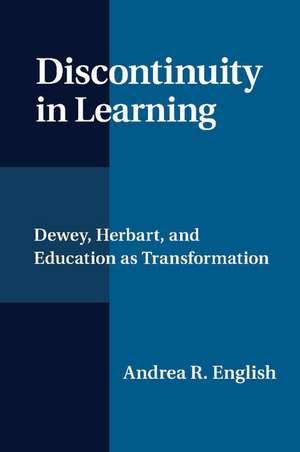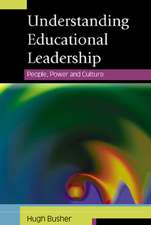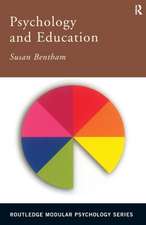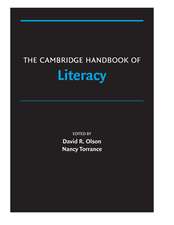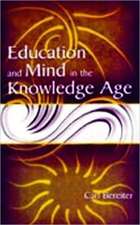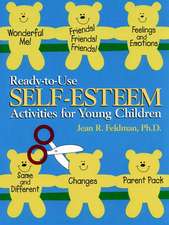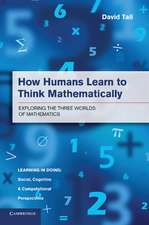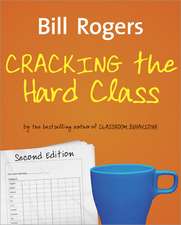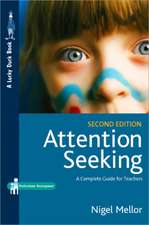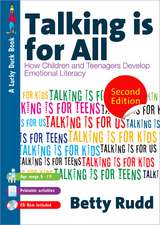Discontinuity in Learning: Dewey, Herbart and Education as Transformation
Autor Andrea R. Englishen Limba Engleză Paperback – 25 iun 2014
| Toate formatele și edițiile | Preț | Express |
|---|---|---|
| Paperback (1) | 319.32 lei 6-8 săpt. | |
| Cambridge University Press – 25 iun 2014 | 319.32 lei 6-8 săpt. | |
| Hardback (1) | 720.63 lei 6-8 săpt. | |
| Cambridge University Press – 28 mar 2013 | 720.63 lei 6-8 săpt. |
Preț: 319.32 lei
Nou
Puncte Express: 479
Preț estimativ în valută:
61.10€ • 63.97$ • 50.56£
61.10€ • 63.97$ • 50.56£
Carte tipărită la comandă
Livrare economică 05-19 aprilie
Preluare comenzi: 021 569.72.76
Specificații
ISBN-13: 9781107448612
ISBN-10: 1107448611
Pagini: 206
Ilustrații: 1 b/w illus.
Dimensiuni: 153 x 230 x 14 mm
Greutate: 0.31 kg
Editura: Cambridge University Press
Colecția Cambridge University Press
Locul publicării:New York, United States
ISBN-10: 1107448611
Pagini: 206
Ilustrații: 1 b/w illus.
Dimensiuni: 153 x 230 x 14 mm
Greutate: 0.31 kg
Editura: Cambridge University Press
Colecția Cambridge University Press
Locul publicării:New York, United States
Cuprins
Prologue. Why Herbart and Dewey?; Part I. Education, Discontinuity, and Transformation: 1. The moral dimension of education; 2. The problem of continuity, the need for struggle, the role of tact; 3. Discontinuity and educational openings in learning; 4. Teaching in the openings of learning; 5. Conclusion: morality, democracy, and pluralist society; Part II. Teaching and Learning Forgotten?: 6. Revisiting 'learning in-between' and umlernen; 7. Pedagogical tact: learning to teach 'in-between'; 8. Perfectibility and recognition of the other for education; Epilogue. Should teachers think? Re(dis)covering the meaning of philosophy for the education of teachers.
Recenzii
'This book opens new doors to the understanding of the learning process, shedding unexpected light on J. F. Herbart's influence on John Dewey's work. Dr English enables the reader to make new sense of the importance of uncertainty and struggle in the learning process. Revealing unexpected connections between J. F. Herbart and John Dewey's work, she enhances our understanding of transformation, tact, and perfectibility. Engaging with this text releases the reader's understanding of learning. This text holds great relevance for the active classroom.' Maxine Greene, William F. Russell Professor in the Foundations of Education Emerita, Columbia University
'Discontinuity in Learning will deepen scholarly understanding of two significant philosophers on education and clarify important concepts - negativity, transformation, active remembering, pedagogical tact, perfectibility, recognition of the other, and so on - with which parents, teachers, and educational leaders can help the young manage their educational experience. Andrea English writes about Herbart and Dewey with an unusually full command of both German and Anglo-American scholarship. The book presents a different, more authentic Herbart than the old Herbartian simulacra, and it renews the reading of Dewey by putting him in a context in which experience appears riskier and more discontinuous and emergent than it does in a bland progressive optimism. The book will be a valuable addition to scholarship in the philosophy of education.' Robert McClintock, Emeritus Professor in the Historical and Philosophical Foundations of Education, Columbia University
'Andrea English's well-crafted, sophisticated study accomplishes several valuable aims. It elucidates significant similarities between the influential work on education of John Dewey and of the nineteenth-century German educationist J. F. Herbart. In so doing, the book reminds us of the power and originality in the latter's pioneering work. At the same time, the author brings into productive dialogue contemporary theories of learning and teaching in English- and German-speaking philosophy of education. Last but hardly least, English's study contributes in multiple ways to our understanding of why difficulty, disorientation, doubt, and the like - what she calls the 'discontinuities' in learning - are indispensable in any meaningful process of human growth.' David T. Hansen, Columbia University
'English has done an admirable job of introducing and explaining the theoretical ideas presented in the first portion of the book. Even more impressive is the way that she weaves these ideas into the development of the second part. This artful weaving allows the reader to consider how notions of discontinuity can benefit teachers and learners alike … Recommended …' J. A. Helfer, Choice
'… hugely enjoyable, well researched, well informed, well written and deeply provocative in the way it compellingly exhorts our attention to examine our core beliefs as educators and to urgently address the future direction of education in the world today.' Gifted Education International
'Discontinuity in Learning will deepen scholarly understanding of two significant philosophers on education and clarify important concepts - negativity, transformation, active remembering, pedagogical tact, perfectibility, recognition of the other, and so on - with which parents, teachers, and educational leaders can help the young manage their educational experience. Andrea English writes about Herbart and Dewey with an unusually full command of both German and Anglo-American scholarship. The book presents a different, more authentic Herbart than the old Herbartian simulacra, and it renews the reading of Dewey by putting him in a context in which experience appears riskier and more discontinuous and emergent than it does in a bland progressive optimism. The book will be a valuable addition to scholarship in the philosophy of education.' Robert McClintock, Emeritus Professor in the Historical and Philosophical Foundations of Education, Columbia University
'Andrea English's well-crafted, sophisticated study accomplishes several valuable aims. It elucidates significant similarities between the influential work on education of John Dewey and of the nineteenth-century German educationist J. F. Herbart. In so doing, the book reminds us of the power and originality in the latter's pioneering work. At the same time, the author brings into productive dialogue contemporary theories of learning and teaching in English- and German-speaking philosophy of education. Last but hardly least, English's study contributes in multiple ways to our understanding of why difficulty, disorientation, doubt, and the like - what she calls the 'discontinuities' in learning - are indispensable in any meaningful process of human growth.' David T. Hansen, Columbia University
'English has done an admirable job of introducing and explaining the theoretical ideas presented in the first portion of the book. Even more impressive is the way that she weaves these ideas into the development of the second part. This artful weaving allows the reader to consider how notions of discontinuity can benefit teachers and learners alike … Recommended …' J. A. Helfer, Choice
'… hugely enjoyable, well researched, well informed, well written and deeply provocative in the way it compellingly exhorts our attention to examine our core beliefs as educators and to urgently address the future direction of education in the world today.' Gifted Education International
Notă biografică
Descriere
Argues for the educational value of discontinuous experiences such as doubt and struggle, based on fresh readings of John Dewey and J. F. Herbart.
